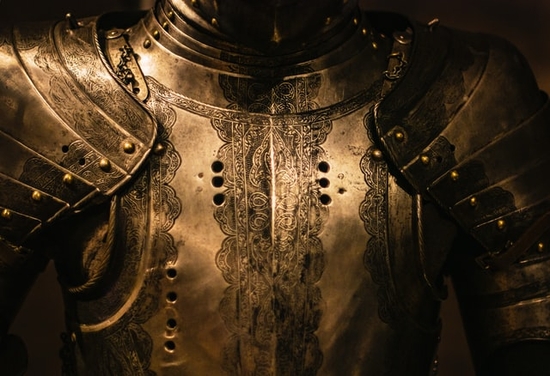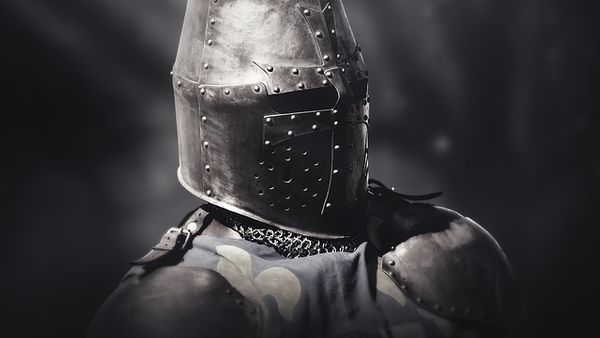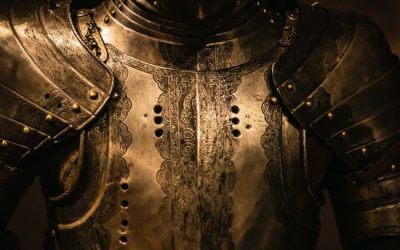In Ephesians 6, the Apostle Paul was helping people understand what it means to defend themselves within a spiritual war (Ephesians 6:10-18).
What does that mean?
In referencing the armor of God, Paul is not encouraging a physical war or physical armor. We are to defend ourselves against Satan or the Devil, who’s primary mission is to turn people away from God.
So let’s look more closely at what this spiritual war entails, and what this whole “armor” consists of. We’ll cover:
- The armor’s meaning and purpose
- Pieces of the armor of God
- Prayer as part of this armor
- What this means for us today
Let’s start by looking at what these verses say.
What does the armor of God mean?

Photo by Henry Hustava on Unsplash
The choice of words in Ephesians to describe this armor is a direct reference to Isaiah 11:4-5 and Isaiah 59:17. The symbolism might seem odd today, but these words are meant to speak to each of us.
“Put on the whole armor of God, that you may be able to stand against the wiles of the devil. For we do not wrestle against flesh and blood, but against principalities, against powers, against the rulers of the darkness of this age, against spiritual hosts of wickedness in the heavenly places. Therefore take up the whole armor of God, that you may be able to withstand in the evil day, and having done all, to stand” (Ephesians 6:11-13, NKJV).
These “powers” and “spiritual hosts of wickedness” are the continued efforts of Satan. He doesn’t fight with conventional weapons but with influence. He sows deception, distraction, and temptation.
We are told in Matthew, “And do not fear those who kill the body but cannot kill the soul. But rather fear Him who is able to destroy both soul and body in hell” (Matthew 10:28, NKJV).
(By the way, do not be deceived by the enemy into believing in a hell where people are punished forever. Paul tells us, “For the wages of sin is death, but the gift of God is eternal life in Christ Jesus our Lord” (Romans 6:23, NKJV).
Death is final, not an eternal torture (Ecclesiastes 9:5). We are offered protection from eternal destruction by faith in God and wearing His armor.)
The full armor of God allows us to defend ourselves against these kinds of forces. We have a God that loves us and wants to protect us. He wants us to live forever with Him.
Pieces of the full armor of God
So let’s look at the individual pieces of the armor of God (Ephesians 6:14-18).
- Belt of truth (holds up the armor of God).
- Breastplate of righteousness (shields the heart, among other important parts of our bodies).
- Shoes of the gospel/sandals with the gospel of peace (to stand firm).
- Shield of faith (protection against direct attacks).
- Helmet of salvation (knowledge).
- Sword of the spirit (direct defense).
- And also prayer (by which we obtain His strength and protection).
Paul used words and images that were understood by his audience at the time.
This is exactly how Jesus spoke to people during His time on earth.
When Jesus called the first disciples who were fishermen, He said, “Follow Me, and I will make you fishers of men” (Matthew 4:19, NKJV).
Paul’s method was similar. The people he addressed in Ephesus understood war. They knew the pieces of armor worn by Roman soldiers at the time.
Belt of truth1
“Stand therefore, having girded your waist with truth” (Ephesians 6:14, NKJV).
Belts of Roman soldiers were crafted from strong metal and leather. It was sturdy enough to hold a sword and keep everything else in order.
Think of the belt as a foundation for all other pieces of the armor.
The belt must be worn first to balance and hold the rest.
For the believer, this foundational piece represents truth.
What is the truth?
The truth is that we desperately need Jesus. The truth is that He died to protect us from eternal death. And we regard God’s word as true above all else.
“Jesus said to him, ‘I am the way, the truth, and the life. No one comes to the Father except through Me’” (John 14:6, NKJV).
Using this truth as the foundation of our spiritual armor, we are able to stand against deception and temptation and be used by God. We are assured protection and salvation.
Jesus also said, “And you shall know the truth, and the truth shall make you free” (John 8:32, NKJV).
With the belt of truth, we are free to live the life God intended for us. This truth is found in Jesus’ saving grace.
Jesus’ teaching proclaimed the truth. We must know this to guard ourselves against the enemy of this war, Satan, the father of lies (John 8:44).
The truth is that God is love, and sin is the opposite of love. We are saved through Jesus Christ, through His sacrifice and promised Second Coming. Truth is His forgiveness of sins. These truths prevail against Satan’s lies.
Believers hold fast to truth.
Just like the belt of truth holds tight the armor of God.
Breastplate of righteousness
“Having put on the breastplate of righteousness” (Ephesians 6:14, NKJV).

Photo by Nik Shuliahin on Unsplash
For Roman soldiers, this piece of the armor was large-scale protection during battle.
After all, it protected essential organs of a soldier, particularly the heart.
Of course, the “heart” protected by the breastplate of righteousness is not our physical heart. The heart is where we maintain our sense of self, feel emotions, and gather our sense of morality. That’s why we say it’s so important for God to “dwell in our hearts.”
In spiritual battle, the breastplate of righteousness protects our heart. Proverbs 4:23 tells us, “Keep thy heart with all diligence; for out of it are the issues of life” (NKJV).
We are not “upright” or moral without Jesus. Human beings do not have righteousness aside from what He has given us.
The breastplate of righteousness is His protection, and it never fails. We are protected from Satan’s attacks through Christ’s righteousness.
There is nothing we can do to earn righteousness. We can not be righteous without Him (Romans 3:10). When we accept Jesus as Savior, it is a gift He gives abundantly (2 Corinthians 5:21; Ephesians 2:8, 9; Philippians 3:9). And we can use this righteousness from God to protect our hearts.
Shoes of the gospel/sandals with the gospel of peace2
“And having shod your feet with the preparation of the gospel of peace” (Ephesians 6:15, NKJV).
Sandals were equipped to protect the feet of Roman soldiers. They provided comfort while marching into battle. The sandals helped soldiers “stand firm” during battle. The soles were thick. The ankle straps protected against blisters.
Believers in Jesus are called to walk as He walked (1 John 2:6). We must march where He leads. Jesus said, “My sheep hear My voice, and I know them, and they follow Me” (John 10:27, NKJV).
Believers are called to follow Him and also must stand firm when needed. That firm standing comes from understanding the gospel. With that understanding, the rest can fall into place.
Shield of faith
“Above all, taking the shield of faith with which you will be able to quench all the fiery darts of the wicked one” (Ephesians 6:16, NKJV).
The Roman soldier’s shield, or scutum, was a complex piece of the armor. It was made of solid wood, leather, and metal. It provided a hefty barrier. Then the shields were covered with animal skin soaked with water.
With this wet skin, fiery darts could be smothered on impact.
What does this have to do with a believer? What are the “fiery darts” against the shield of faith?
Faith is our shield in a spiritual war. Faith in Jesus gives us His protection.
Jesus said, “He who believes in Me, as the Scripture has said, out of his heart will flow rivers of living water” (John 7:38, NKJV).
The shield of faith needs to be dipped in the living water of His word.
To the woman at the well, Jesus said, “whoever drinks of the water that I shall give him will never thirst. But the water that I shall give him will become in him a fountain of water springing up into everlasting life” (John 4:14, NKJV).
We are told that “in the beginning was the Word, and the Word was with God, and the Word was God” (John 1:1, NKJV).
What exactly is this faith which we are called to hold like a shield? “Now faith is the substance of things hoped for, the evidence of things not seen” (Hebrews 11:1, NKJV).
We do not see God, but we have evidence of His love and works. We did not witness Jesus’ life and sacrifice, but we have testimony of it in the Word—the Bible.
And we can place our faith in God because the truth is in the Word.
Helmet of salvation
“And take the helmet of salvation…” (Ephesians 6:17, NKJV).
While each piece of armor is crucial, the helmet protects the head. The helmet of a Roman soldier shielded the entire head, face, and eyes.
In battle, these could be the most vulnerable parts of the body. The helmet of salvation is perhaps one of the most critical pieces of the armor for a believer.
The head is considered the source of knowledge, and we are called to know the salvation Jesus offers.
We are granted salvation when we believe and trust in Jesus’ death and resurrection for our sins (I John 1:9, NKJV).
The knowledge of this salvation gives us strength to fight. “And this is the testimony: that God has given us eternal life, and this life is in His Son” (1 John 5:11-12, NKJV).
Sword of the Spirit
“And the sword of the Spirit, which is the word of God” (Ephesians 6:17, NKJV).
The sword can be used for fighting or protection.
The word of God is the sword of the believer. The word gives us faith to use it defensively, when we’re being attacked with lies, or to use it proactively, by letting the word of God be evident in how we live our lives.
How did Christ battle Satan when tempted? He used Scripture with each response (Luke 4: 1-13).
God’s word is called “living and powerful, and sharper than any two-edged sword, piercing even to the division of soul and spirit, and of joints and marrow, and is a discerner of the thoughts and intents of the heart” (Hebrews 4:12, NKJV).
The more time we spend reading God’s word, the more we will understand. The more we understand God’s word, the more we can apply it to our daily lives.
Prayer
“Praying always with all prayer and supplication in the Spirit, being watchful to this end with all perseverance and supplication for all the saints” (Ephesians 6:18, NKJV).
Cloaked in the armor of God, prayer is what powers everything. It’s our connection to God.
Prayer allows us communication with God, and to be consciously relying on Him to guide us and strengthen us.
We are advised to, “be anxious for nothing, but in everything by prayer and supplication, with thanksgiving, let your requests be made known to God; and the peace of God, which surpasses all understanding, will guard your hearts and minds through Christ Jesus” (Philippians 4:6-7, NKJV).
So even if prayer isn’t a piece of the armor, it’s still part of the whole outfit.
What does the idea of God’s armor mean for us today?
How does one “put on” the armor of God?
Fortunately, this doesn’t require heavy lifting. Wearing this armor starts in the simplest of ways: believing. When we accept Jesus’ sacrifice, we have begun our journey with Him. We live as a new creation, born-again, pursuing righteousness.
And even if we’re still learning how everything works, the armor of God is something God will freely give. Our part is to acknowledge that He is the source of our strength, and in Him is where we find growth.
In a way, we can polish and reinforce our spiritual armor when we read and study Scripture. And every time we pray, watch for God’s small blessings in life, and look at the world through the lens of the Bible, our armor’s effectiveness only increases.
This doesn’t mean we are to live life as if it’s a war. Paul wasn’t calling all humans to become like drill sergeants or berserker warriors when it comes to living Christian lives.
It’s true the enemy is real, and sin is a struggle for every human being. But we’re given the armor, not weapons, to deal with these spiritual attacks.
We can also find comfort in knowing that the armor of God is the only armor we need when it comes to this great controversy against good and evil. We don’t need to make our own. God will “supply all your needs according to His riches in glory in Christ Jesus” (Philippians 4:19, CSB).
His truth tells us what we need to know. His righteousness protects our hearts, and His salvation gives us life with Him. He’s given us support to stand and go where He leads. Faith in Him shields us from deception, and the Holy Spirit fights for us and parries surprise attacks.
Want to learn more about the concepts with the Armor of God?
- Editor in Chief, “The 7 Pieces of the Armor of God and How to Use Them,” https://connectusfund.org/7-pieces-of-the-armor-of-god, 2 December, 2019. [↵]
- Bibleinfo.com, “Armor of God: What is it?,” https://www.bibleinfo.com/en/questions/armor-of-god, last accessed 13 December, 2021. [↵]
More Answers
What We Can Learn from the Life of Joshua
Joshua was an iconic leader in the Old Testament of the Bible. As a successor to Moses, he was both a humble servant of God and a strong warrior. God called Him to lead the nation of Israel to take possession of Canaan, the Promised Land—a task he took on with faith and courage.
Why is Abraham Important in the Bible?
God communicated directly with Abraham and made a covenant with him that would provide land, protection, and fruitfulness for his descendants. And he indeed became the father of many nations, making him a foundational figure in three monotheistic world religions: Judaism, Islam, and Christianity (Genesis 17:5, 19-20; Genesis 25:1-6, 12-18).
Who Were the Judges of Israel in the Old Testament?
Times of crisis call for men and women of action. The Israelites, newly settled in the Promised Land, found themselves in those times. As enemy nations attacked and oppressed the tribes, they cried out to God for help. He, in turn, sent them men and women of action—known as judges.
What is the New Testament? [About Each Book and Key Lessons]
The New Testament is the second section of the Bible, describing Jesus and how He came to this world to reveal the love of God. It tells about His ministry, His death and resurrection, and the church that resulted.
Healing in the Bible
Have you ever felt like healing seemed so far away? Like it wouldn’t be possible for you? What you most want is a glimmer of hope or a bit of encouragement.
All about the prophets in the Bible
Prophets were individuals in the Bible who received messages from God and communicated those messages to the recipients—whether through speaking or writing. Their writings, known as prophetic books, comprise a huge part of the Bible.
Life Lessons from Joseph in the Bible
Joseph is one of the more well-known people from the Bible’s Old Testament. He showed remarkable strength, faith, and patience—even while facing great difficulty and injustice. All because he let God lead.
Understanding Prophecy in the Bible
Seventh-day Adventists have emphasized Bible prophecy from the beginning. We have our roots in the study of God’s Word, especially the prophecies that have to do with the future.
How Do You Tell a False Prophet From a True Prophet?
The Bible speaks of both true and false prophets and gives us specific guidance on how to test prophets and their claims. Scripture is our guard against deception.
All About the Old Testament
The Old Testament is the first section of the Bible and makes up about three-quarters of its material. It lays out the story of Creation, humanity’s fall into sin, and God’s promise to rescue us from sin.
Didn’t find your answer? Ask us!
We understand your concern of having questions but not knowing who to ask—we’ve felt it ourselves. When you’re ready to learn more about Adventists, send us a question! We know a thing or two about Adventists.






![What is the New Testament? [About Each Book and Key Lessons]](https://www.askanadventistfriend.com/wp-content/uploads/2022/02/new-testament-400x250.jpg)





